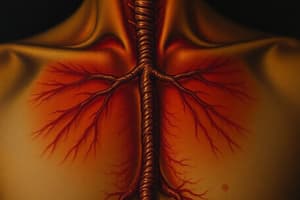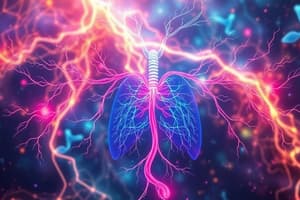Podcast
Questions and Answers
What is the primary speed of hormonal communication compared to nervous communication?
What is the primary speed of hormonal communication compared to nervous communication?
- Faster than nervous communication
- Variable, depending on the specific hormone
- Equal speed to nervous communication
- Slower than nervous communication (correct)
Which characteristic differentiates hormonal communication from nervous communication in terms of duration?
Which characteristic differentiates hormonal communication from nervous communication in terms of duration?
- Hormonal communication is short-lived, nervous is longer lasting
- Nervous communication lasts for hours, while hormonal lasts days
- Both have similar durations
- Hormonal communication is longer lasting, nervous is short-lived (correct)
What primarily controls the release of hormones in the endocrine system?
What primarily controls the release of hormones in the endocrine system?
- Environmental stimuli alone
- Nervous impulses only
- Feedback from target organs exclusively
- Chemical signals from other hormones or the nervous system (correct)
Which of the following is a significant function of hormones?
Which of the following is a significant function of hormones?
How do water-soluble hormones primarily interact with their target cells?
How do water-soluble hormones primarily interact with their target cells?
What type of gland releases hormones directly into the bloodstream?
What type of gland releases hormones directly into the bloodstream?
Which of the following is NOT a characteristic of hormonal communication?
Which of the following is NOT a characteristic of hormonal communication?
What is a primary mode of action for lipid-soluble hormones?
What is a primary mode of action for lipid-soluble hormones?
Which aspect of communication do hormonal and nervous systems NOT have in common?
Which aspect of communication do hormonal and nervous systems NOT have in common?
What is the relationship between hormone concentration and its effect in the body?
What is the relationship between hormone concentration and its effect in the body?
Which type of hormone directly binds to intracellular receptors to influence gene expression?
Which type of hormone directly binds to intracellular receptors to influence gene expression?
How do water-soluble hormones primarily convey their message to target cells?
How do water-soluble hormones primarily convey their message to target cells?
What mechanism allows insulin and glucagon to exert their effects on blood glucose levels?
What mechanism allows insulin and glucagon to exert their effects on blood glucose levels?
Which cells in the pancreas are responsible for the release of glucagon?
Which cells in the pancreas are responsible for the release of glucagon?
What role do receptor proteins play in the action of water-soluble hormones?
What role do receptor proteins play in the action of water-soluble hormones?
Which of the following hormones primarily regulates metabolic processes involved in stress responses?
Which of the following hormones primarily regulates metabolic processes involved in stress responses?
In the feedback mechanism involving insulin and glucagon, what triggers the release of insulin?
In the feedback mechanism involving insulin and glucagon, what triggers the release of insulin?
Which of the following sequences correctly describes the actions of steroid hormones?
Which of the following sequences correctly describes the actions of steroid hormones?
What process helps maintain homeostasis in blood glucose levels through opposing hormones?
What process helps maintain homeostasis in blood glucose levels through opposing hormones?
What is the primary function of the hypothalamus in relation to the pituitary gland?
What is the primary function of the hypothalamus in relation to the pituitary gland?
Which of the following describes the role of the thyroid gland?
Which of the following describes the role of the thyroid gland?
Which condition is characterized by an autoimmune attack resulting in insulin dependence?
Which condition is characterized by an autoimmune attack resulting in insulin dependence?
What is a significant consequence of hyperthyroidism, specifically in Graves' disease?
What is a significant consequence of hyperthyroidism, specifically in Graves' disease?
Which hormone is released by the anterior pituitary and stimulates the thyroid gland?
Which hormone is released by the anterior pituitary and stimulates the thyroid gland?
Which statement best describes negative feedback in hormonal regulation?
Which statement best describes negative feedback in hormonal regulation?
What is one of the major health burdens associated with diabetes?
What is one of the major health burdens associated with diabetes?
What conditions collectively make up the metabolic syndrome?
What conditions collectively make up the metabolic syndrome?
What is the primary characteristic of gestational diabetes?
What is the primary characteristic of gestational diabetes?
What causes a goitre in cases of hypothyroidism?
What causes a goitre in cases of hypothyroidism?
Flashcards
Compare the nervous and endocrine systems
Compare the nervous and endocrine systems
The nervous system uses electrical impulses to send messages quickly over short distances. The endocrine system uses hormones, chemical messengers that travel through the bloodstream to reach target cells, and have longer-lasting effects.
What are hormones?
What are hormones?
Hormones are chemical messengers produced by endocrine glands. They regulate various bodily processes including energy use, metabolism, and growth.
How do hormones work?
How do hormones work?
Hormones work by binding to specific receptors on target cells, triggering a response within the cell. This interaction is like a key fitting into a lock.
How do water-soluble hormones work?
How do water-soluble hormones work?
Signup and view all the flashcards
How do lipid-soluble hormones work?
How do lipid-soluble hormones work?
Signup and view all the flashcards
How is hormone release regulated?
How is hormone release regulated?
Signup and view all the flashcards
Describe the function of the pituitary gland
Describe the function of the pituitary gland
Signup and view all the flashcards
How is the pituitary gland controlled?
How is the pituitary gland controlled?
Signup and view all the flashcards
What are endocrine glands?
What are endocrine glands?
Signup and view all the flashcards
How do the nervous and endocrine systems work together?
How do the nervous and endocrine systems work together?
Signup and view all the flashcards
Lipid-soluble hormones
Lipid-soluble hormones
Signup and view all the flashcards
Water-soluble hormones
Water-soluble hormones
Signup and view all the flashcards
Amines
Amines
Signup and view all the flashcards
Steroids
Steroids
Signup and view all the flashcards
Insulin
Insulin
Signup and view all the flashcards
Glucagon
Glucagon
Signup and view all the flashcards
Negative feedback
Negative feedback
Signup and view all the flashcards
Alpha cells
Alpha cells
Signup and view all the flashcards
Beta cells
Beta cells
Signup and view all the flashcards
Steroid hormone regulation of gene expression
Steroid hormone regulation of gene expression
Signup and view all the flashcards
What hormones does the posterior pituitary gland release?
What hormones does the posterior pituitary gland release?
Signup and view all the flashcards
How is the anterior pituitary gland controlled?
How is the anterior pituitary gland controlled?
Signup and view all the flashcards
What is the function of thyroid hormone?
What is the function of thyroid hormone?
Signup and view all the flashcards
What can cause goitre?
What can cause goitre?
Signup and view all the flashcards
What is Graves' disease?
What is Graves' disease?
Signup and view all the flashcards
Compare the endocrine and nervous systems.
Compare the endocrine and nervous systems.
Signup and view all the flashcards
How are hormones classified?
How are hormones classified?
Signup and view all the flashcards
How are hormone levels controlled?
How are hormone levels controlled?
Signup and view all the flashcards
How does the hypothalamus control the pituitary gland?
How does the hypothalamus control the pituitary gland?
Signup and view all the flashcards
What is diabetes?
What is diabetes?
Signup and view all the flashcards
Study Notes
Hormones and Endocrine System
- The endocrine system and nervous system work together to coordinate and complement responses to changes in the environment.
- Hormones are chemical messengers that circulate in the bloodstream, regulating energy use, metabolism, and growth.
- Hormones maintain homeostasis.
- They are secreted into the bloodstream by ductless endocrine glands, reaching all parts of the body via bloodstream, and affecting target cells.
- A small amount of hormones produces a significant effect.
- Hormones have different receptors in different cells.
- This leads to different responses within different cells and tissues (e.g. vasoconstriction versus vasodilation).
- Two major communication systems: nervous & endocrine.
- Endocrine effects are slower than nervous system effects, but their effects are more widespread and last longer.
Types of Hormones
- Three main types of hormones exist:
- Proteins (water-soluble): Examples include insulin and glucagon.
- Amines (either water or lipid soluble): Synthesized from amino acids (usually tyrosine). Example is adrenaline.
- Steroids (lipid soluble): Examples include cortisol, estrogen, and progesterone.
Lipid-Soluble Hormones
- Pass through the target cell membrane.
- Bind to an intracellular receptor.
- The hormone-receptor complex binds to DNA, which turns specific genes on or off.
- This leads to the synthesis of new proteins.
Water-Soluble Hormones
- Bind to receptors on the cell membrane target cell.
- Receptor protein activates a signal-transduction pathway.
- A series of relay molecules transmit the signal.
- A cellular response occurs.
Adrenaline and Glucose Release
- Adrenaline (epinephrine) stimulates release of glucose.
- This is controlled via the G protein-coupled receptor.
- Adenylyl cyclase is activated, leading to cAMP production and activation of protein kinases.
- In turn, glycogen synthesis is inhibited, and glycogen breakdown is promoted, ultimately releasing glucose.
Control of Glucose
- Insulin and glucagon are antagonistic hormones.
- Negative feedback mechanisms control glucose levels in the blood.
- Glucose levels in blood trigger the release of insulin and glucagon in the pancreas.
- The pancreas comprises alpha and beta cells.
- Alpha cells produce glucagon.
- Beta cells produce insulin.
- Elevated blood glucose triggers insulin release, promoting blood glucose uptake in the blood.
- Decreased blood glucose triggers glucagon release, promoting glucose release into the blood.
Steroid Hormones and Gene Expression
- Steroid hormones regulate gene expression.
- Receptors are located in the cytosol.
- Hormone-receptor complex, conformational change, nuclear translocation activates gene transcription and production of proteins.
Mechanisms Controlling Hormone Release
- Specific metabolites in the blood (e.g., glucose).
- Other hormones in the blood (e.g., TSH, thyroid-stimulating hormone).
- Stimulation of neurons (using the autonomic nervous system) e.g. adrenaline.
Pituitary Gland and Hypothalamus
- The pituitary gland has anterior and posterior parts.
- The anterior pituitary releases hormones that regulate many processes in the body.
- The hypothalamus controls the release of anterior pituitary hormones.
- Special network blood vessels connect the hypothalamus and anterior pituitary.
- Hypothalamus produces stimulatory/inhibitory hormones.
- The hypothalamus synthesizes and secretes ADH & oxytocin into the posterior pituitary for release into bloodstream via vesicles.
Posterior Pituitary
- Hormones made in the hypothalamus are stored and transported in vesicles in the posterior pituitary.
- These hormones are released into the bloodstream.
- Positive feedback involved (e.g., suckling during breastfeeding).
The Anterior Pituitary
- Special network blood vessels carry hormones from the hypothalamus (releasing hormones) to the anterior pituitary for hormone secretion.
- Hormones produced or regulated in anterior pituitary include TSH, ACTH, FSH, LH, GH, Prolactin, Endorphins.
The Thyroid
- The thyroid gland secretes thyroid hormone (T3 and T4).
- Regulates heart rate, muscle tone, bioenergetics (energy in cells), digestive and reproductive function.
Control of Thyroxine Secretion
- Negative feedback mechanisms regulate the release of thyroxine (T3 and T4).
- If the body is cold, the hypothalamus secretes TRH.
- The anterior pituitary gland in turn releases TSH, triggering the thyroid gland to release T3 and T4.
- Increased levels of T3 and T4 have a negative effect on the hypothalamus and anterior pituitary, reducing TSH and TRH release back to original levels.
Hypothyroidism and Goitre
- Insufficient thyroid hormone production can cause hypothyroidism.
- Insufficient iodine for the synthesis of thyroid hormones can result in enlarged thyroid gland (goitre).
- Leads to weight gain, lethargy, and cold intolerance.
Hyperthyroidism
- Constant production and release of thyroid hormones result in hyperthyroidism.
- Characterized by weight loss, tremors, sweating, hyperactivity and Graves' ophthalmology.
Summary
- Two communication systems: nervous & endocrine; endocrine releases are slower, more widespread, and longer lasting.
- Main hormone types: steroid and non-steroid, with different modes of action (e.g. lipid versus water soluble).
- Hormone levels controlled by negative feedback.
- The hypothalamus controls pituitary secretions using nervous and hormonal control.
Classification of Diabetes
- Type 1 diabetes: an autoimmune attack, managed with insulin (genetic risk).
- Type 2 diabetes: metabolic disorder, managed via treatment and lifestyle (lifestyle and genetic risk).
- Gestational diabetes: special case of type 2 diabetes, temporary during pregnancy.
Diabetes Burden
- Diabetes is a severe worldwide healthcare issue.
- Prevalence varies by region.
- Millions undiagnosed.
- Diabetic complications place significant financial and health burdens on healthcare systems.
Metabolic Syndrome
- Cluster of disorders, increasing risk of type 2 diabetes and cardiovascular disease.
- Includes obesity, insulin resistance, and hyperglycaemia.
Cardiovascular Disease Research
- Researchers study high blood pressure and other blood vessel issues using systems biology approaches.
- VSMC (vascular smooth muscle cells) are focus, especially how they interact with myeloid cells.
SysVasc Consortium
- A project (2014-2017) involving translational systems biology, identifying targets for disease treatment.
Type 2 Diabetes
- A complex multifactorial disease with multiple symptoms, risk factors and organs involved.
T2D Metabolic Context
- T2D is increasingly recognised as a component of the metabolic syndrome, linked to increased adipose tissue, insulin resistance and hyperglycaemia.
Insulin Sensitivity of Skeletal Muscle
- Insulin signals initiate intracellular signalling pathways resulting in glucose uptake and glycogen synthesis in skeletal muscles.
Link between Diabetes, Obesity and Cancer
- The Lancet Diabetes and Endocrinology (2018) study shows a link among diabetes, obesity and increased cancer incidence.
Studying That Suits You
Use AI to generate personalized quizzes and flashcards to suit your learning preferences.




